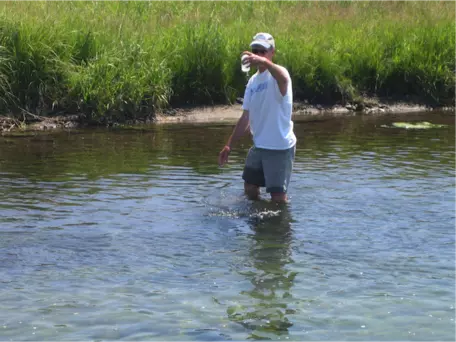Teaching Nanoscience in the Earth and Environmental Sciences
Monday, April 29, 2019
12:00 pm PT | 1:00 pm MT | 2:00 pm CT | 3:00 pm ET
Presenters: Dave Mogk (Montana State University) and Mike Hochella (Virginia Tech)
This webinar is part of a series supporting teaching with InTeGrate principles, using InTeGrate-developed and curated materials as tools.
The registration deadline has passed.
Summary

This webinar will present an overview of basic concepts about nanoscience, and the many ways that nanomaterials interact with the Earth system. Nanomaterials (natural, engineered and incidental) play central roles in the energetics and mass balance of Earth processes, and also have huge impacts on environmental and human health. At the nano-scale the "rules" are different, and there are many examples of size dependence of physical and chemical properties of materials that may be quite different on the nano- vs. micro- or meso-scale. This webinar will summarize the key concepts about nanoscience in the Earth system recently published in 10-page review article in a recent issue of Science: Natural, incidental, and engineered nanomaterials and their impacts on the Earth system.
We will also provide an overview of a new website that supports teaching about nanoscience in your regular course work (e.g., Mineralogy, Geochemistry, Petrology, Hydrology, Environmental Geology....): Teaching Nanoscience Across the STEM Curriculum. We provide suggestions on "What", "Why", and "How" to teach nanoscience. There is an introduction to basic concepts of nanoscience, and perhaps most importantly, we have developed an on-line annotated bibliography of over 500 references that can be readily integrated into your coursework on Nanoscience Topics Across the Geoscience Curriculum, including human health, societal impacts, and ethics. Powerpoint presentations from the Goldschmidt 2017 and 2018 Nanoscience workshops, and the 2018 NanoEarth workshops are also posted on the workshop program pages.
Webinar Goals
The goals of this webinar are to :
- Present an overview of fundamental concepts of nanoscience, with examples of how these impact the Earth system;
- Present an overview of new online instructional resources on teaching nanoscience to facilitate inclusion in Earth and Environmental Science courses; and,
- Explore examples of where and how nanoscience could be integrated into existing courses (interactive brainstorming with participants).
Logistics
Time - 12:00 pm PT | 1:00 pm MT | 2:00 pm CT | 3:00 pm ET
Duration - 1 hour
Format - Online web presentation via Zoom meeting software with questions and discussion. Go to the webinar technology page for information on using Zoom. Detailed instructions for joining the webinar will be emailed to registered participants one day prior to the webinar.
Preparation - There is no advance preparation required for this webinar. We encourage participants to view the websites of the organizations mentioned in the workshop summary.
The registration deadline has passed.
Please email Mitchell Awalt (mawalt@carleton.edu) if you have any questions about this event.
Presenters
Dave Mogk, Professor, Dept. of Earth Sciences, Montana State University
Mike Hochella, University Distinguished Professor, Geosciences, Virginia Tech
Tentative Program
- Welcome and introductory remarks – Mitchell Awalt, SERC
- Nanoscience concepts and impacts on Earth and Environmental Science (Acrobat (PDF) 2.9MB Apr29 19) - Mike Hochella, Virginia Tech
- Teaching Nanoscience in the Earth and Environmental Sciences (PowerPoint 2007 (.pptx) 48.8MB Apr29 19) - Dave Mogk, Montana State University
- Discussion and questions
- Opportunities for further interaction - Mitchell Awalt, SERC
- Webinar Evaluation
Resources
- Teaching Nanotechnology Across the STEM Curriculum
- Teaching Petrology Using the Primary Scientific Literature
-
Full citation to Science article: Hochella, M. F., Mogk, D. W., Ranville, J., Allen, I. C., Luther, G. W., Marr, L. C., McGrail, B. P., Murayama, M., Qafoku, N. P., Rosso, K. M., Sahai, N., Schroeder, P. A., Vikesland, P., Westerhoff, P., and Yang, Y., 2019, Natural, incidental, and engineered nanomaterials and their impacts on the Earth system: Science, v. 363, no. 6434, p. eaau8299.

